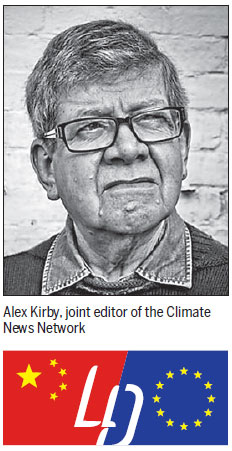Hope for the future
Updated: 2015-05-01 08:03
By Alex Kirby(China Daily Europe)
|
|||||||||||
There will always be disagreements between the EU and China, but both sides understand that their 'eternal and perpetual interests' are identical
It does not feel like 40 years since we began our diplomatic conversation. It was a game-changing moment, because for decades China had been, for most Europeans, a deeply mysterious place. Today, by contrast, it seems almost homey. Leaving Beijing the last time I was there, I caught the metro near Renmin University of China, changed trains twice and in minutes was at the airport - easier than getting from Heathrow to central London. My wife, who has virtually no sense of direction, even learned to use Beijing's bus system. We feel at home in the Chinese capital.
So much has changed in these 40 years, and for both diplomats and journalists one of the most striking changes is technological. There are serious arguments that diplomats are no longer needed, and that communications are now so transformed that governments should speak directly to one another with no need for intermediaries living in imposing embassies. Diplomats, just like journalists, work in a world very different from 1975.
One obvious technological change in these four decades is in international travel. Apart from a few fairly well-defined areas of London and other big cities, Chinese people were conspicuous by their rarity in the rest of the United Kingdom, and in most of Europe as well. Not today. It's as easy to find a flight from Beijing and many other Chinese cities to Europe's political and financial capitals as it is to fly from London to the United States or Australia. In the small country town where I live in southern England, Chinese faces and voices are now too familiar to excite comment.

That is as it should be, and it should give us hope for the future. It is usually much easier to quarrel with someone you do not know or understand than with a friend, or even an acquaintance. And that applies to states as well as to individuals. The European Union itself has helped to make the continent's hideous wars much less likely (one good argument for the UK remaining part of the EU, despite some British politicians' pleas that the UK should leave it). The people of China and those of Europe can now get to know one another, building layers of trust and friendship, recognizing that what may separate us is far less significant than what unites us.
That is certainly true in the area where I work: climate change. Especially since last year's agreement with the US on limiting greenhouse gas emissions, China has proved itself a global leader in trying to prevent the world crossing the internationally agreed 2C threshold for the average rise in temperatures beyond pre-industrial levels. Beijing knows that there is no Chinese atmosphere, any more than there is a European or American atmosphere, and it is acting on that knowledge. I look forward to the day when it acts as bravely and wisely to conserve its wildlife.
But we live in the real world, not some idealized version of it. And in the real world even friends can disagree. Sometimes they manage to live with their disagreements, but not always. There are disagreements already between China and Europe - over human rights, for example, and the European arms embargo. It is possible to envisage other disagreements arising in the future, perhaps over foreign policy. What will happen then?
Technology changes, and so do other parts of life. One of the most significant changes in my lifetime has been the growth of a globalized world, and the way our understanding of how our countries' place in the world has changed, whichever country is our home.
We now realize that there is no distinct nationally governed atmosphere. There is one global atmosphere, and if we do not learn to care for it equally we shall together pay the price for abusing it. Whenever I have visited China, I have been impressed and encouraged by the obvious understanding of this basic physical truth shown by Chinese journalists. If China's journalists are helping its citizens to understand the reality of a globalized world, then we can expect that the people of China will share that understanding and act on it.
So let the flow of people young and old between China and Europe continue - and grow. Before 1975 we could only imagine you. Now we know you, and we know we have so much to share. That way understanding will grow.
Lord Palmerston was a 19th century British politician. One quotation attributed to him is this: "England has no eternal friends, England has no perpetual enemies, England has only eternal and perpetual interests." He was wrong.
The "eternal and perpetual interests" of us all are identical. Knowing each other better will protect them.
The author is the joint editor of the Climate News Network.
(China Daily European Weekly 05/01/2015 page9)
Today's Top News
Protest against police violence expands to NYC
Milan tightens security ahead of Expo opening
Chinese scientists discover 'batman dinosaur'
China trainmakers seek control of Bombardier's rail unit
US Senate rejects bid to toughen Iran nuclear review bill
New Zealand voices dismay at executions in Indonesia
China hits out as Abe visits the US
No hiding place overseas for fugitive officials
Hot Topics
Lunar probe , China growth forecasts, Emission rules get tougher, China seen through 'colored lens', International board,
Editor's Picks

|

|

|

|

|

|






